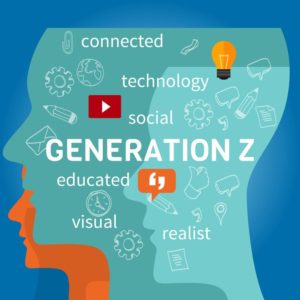By Rose O. Sherman, EdD, RN, NEA-BC, FAAN
 I have been asked many questions recently about our newest generation in the workforce – Generation Z. Born after 1995 (no official consensus yet on when this generation year will end but most think around 2010) , the oldest members are 24 and starting to enter the nursing workforce in large numbers. From their earliest youth, Generation Z have been true digital natives. They don’t know a world without the internet, social networking sites, and mobile technologies. Although their comfort with technology is similar to Millennials, generational theorists report that this generation is likely to be different in a number of ways.
I have been asked many questions recently about our newest generation in the workforce – Generation Z. Born after 1995 (no official consensus yet on when this generation year will end but most think around 2010) , the oldest members are 24 and starting to enter the nursing workforce in large numbers. From their earliest youth, Generation Z have been true digital natives. They don’t know a world without the internet, social networking sites, and mobile technologies. Although their comfort with technology is similar to Millennials, generational theorists report that this generation is likely to be different in a number of ways.
Gen Zers value individual expression and avoid labels. They mobilize themselves for a variety of causes. They believe profoundly in the efficacy of dialogue to solve conflicts and improve the world. Finally, they make decisions and relate to institutions in a highly analytical and pragmatic way. They have been compared to the “silent or veteran generation” in their world views. As a generation, they are obsessed with safety and fearful of their economic futures. They want stability in their careers and will probably be less likely than Millennials to job hop which may be great news for healthcare organizations. Growing up in a culturally diverse world, they don’ understand why there is inequality with respect to gender, race or sexual orientation. They are quick to call out discrepancies between expressed values and actual behavior.
Unlike Millennials, Gen Z is said to be defined by its competitiveness. They want to work on their own and be judged on their own merits rather than those of their team. They may need to be taught team backup as it will not be a natural behavior. We may see fewer Gen Zs going back to graduate school. More of them are skipping higher education than their millennial counterparts, and moving straight into the workforce. They’d rather avoid the years of debt and try one of the newer, more affordable options. Many started businesses while in high school.
Some key challenges for healthcare employers with this generation could include:
- A propensity to multi-task with challenges staying on task.
- High rates of anxiety, depression and suicide.
- An even greater need for one to one coaching and immediate feedback than earlier generations.
- Inexperience with the type of face to face conversations and connections needed to insure a great patient experience.
- The first nursing job may be the first employment with an expectation that the workplace will conform to their needs.
Keep in mind that every member of a generation is an individual and will have their own unique traits. Wise leaders pay attention to the changes in their workforce so they can adjust to meet their needs and expectations.
Read to Lead
Elmore, T. & McPeak, A. (2019). Generation Z Unfiltered. Poet Gardener Publishing.
Kleinschmidt, M. (October 2019). Generation Z Characteristics: 5 Infographics on the Gen Z Lifestyle
Patel, D. (September 21st, 2017 Forbes Blog). 8 Ways Generation Z Will Differ From Millennials In The Workplace
© emergingrnleader.com 2019
Read Rose Sherman’s new book – The Nurse Leader Coach: Become the Boss No One Wants to Leave


 LinkedIn
LinkedIn Instagram
Instagram